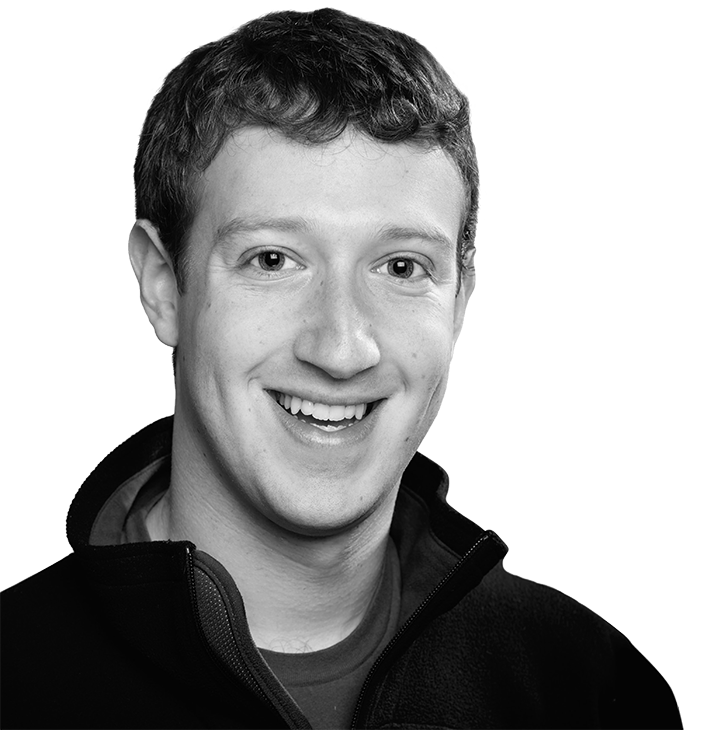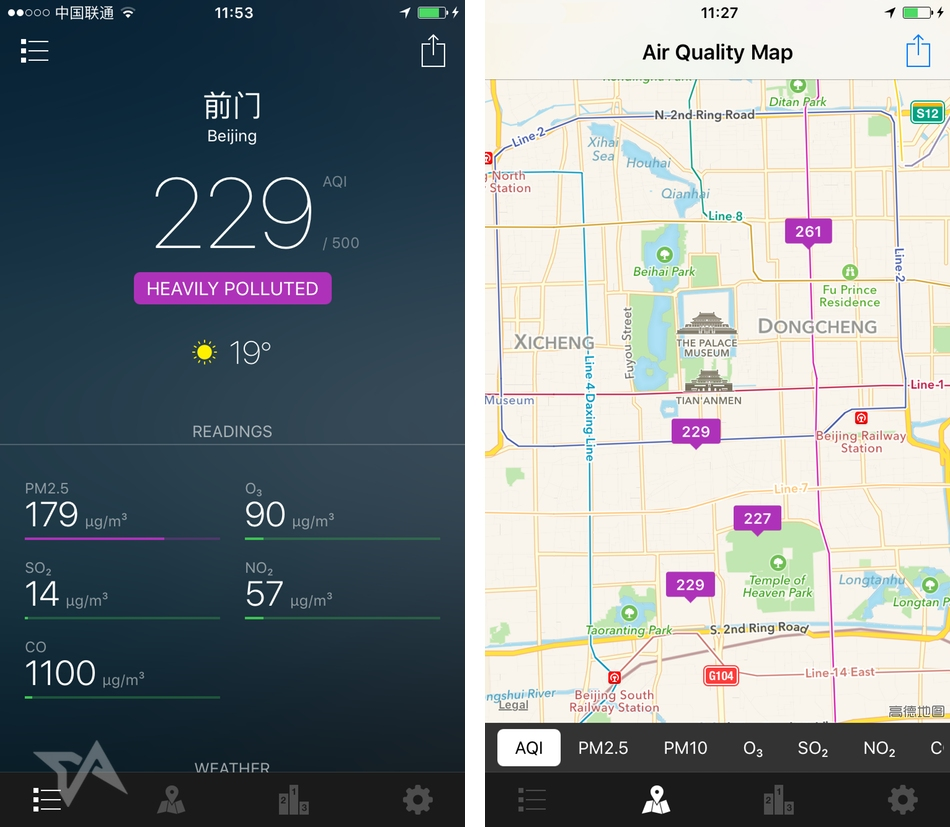
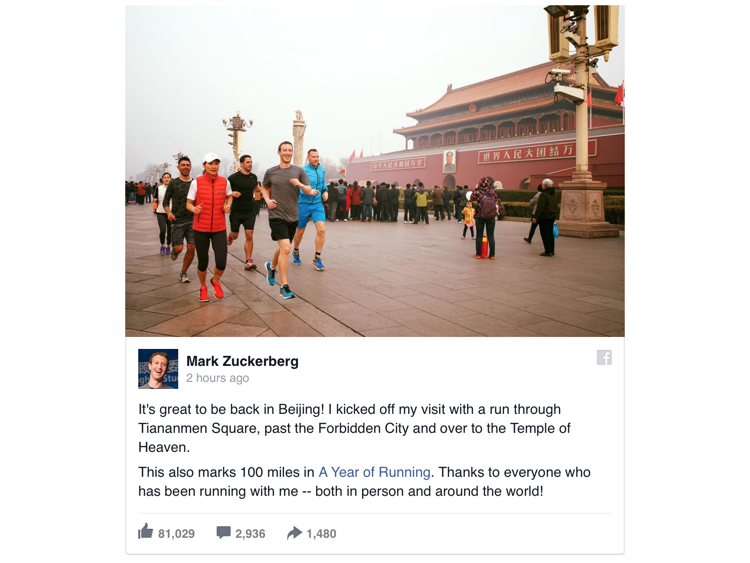
Zuckerberg in China



Mark Zuckerberg posted this image, now known as the “smog jog,” on his personal Facebook page on the morning of March 18th, 2016. There is no mention of smog or pollution in the text he added, nor is he nor any member of his entourage wearing a protective face mask. Most of the people we see in the background have their backs to the camera so we cannot see if they are wearing face masks either. Only one person faces us, a little girl. She is holding a white balloon. The grey haze is our only visual cue that something might be off with the air quality.
The air quality was off the charts. A reading taken at 9am at the United States Embassy in Beijing, 90 minutes before Zuckerberg posted this image provides us with a clear picture of just how off. A level of PM2.5, the atmospheric particulate matter (PM) had a diameter of less than 2.5 micrometers. Studies have found that exposure to this level of pollution can lead to premature death from heart and lung disease. These fine particles also can exacerbate asthma, bronchitis and other respiratory problems. So the haze is hazardous, the air is dangerous, as the screen grabs from an air quality app popular with both foreigners and natives tell us. This is most definitely a jog through smog.

While this image does not convey the quality of the air it most certainly conveys Zuckerberg’s thirst to run free in China. Facebook has been blocked in China since 2009, Mark Zuckerberg’s fame in China is not as founder of the world’s premiere social network but rather as the founder of 404 not found. Facebook’s investors are always pestering Zuckerberg with the question “Where does the next billion users come from?” China (with it’s 2.4 billion people) offers him a tantalizing simple one word answer. Zuckerberg is by no means the first Western businessman to find himself locked out of China, but he is the first to make a total spectacle of himself trying to gain entry. The smog jog provides us “and future history books” with a perfect snapshot of this spectacle.
This image also offers us insights into how the Chinese government manages sensitive information online and the expectations it has for tech companies, “both domestic and foreign”. I’m convinced Mark Zuckerberg is using this image to telegraph just how down he is with these expectations. This is a Made For China Zuck.
Once you understand who this image is for, then you can make sense of the expression on his face. He’s showing off. His giddy go get ‘em grin gives the game away. This is what makes this a next next level Zuck. Even if he never makes it into China he should be proud of this image. He has created one of the greatest propaganda images of our time.
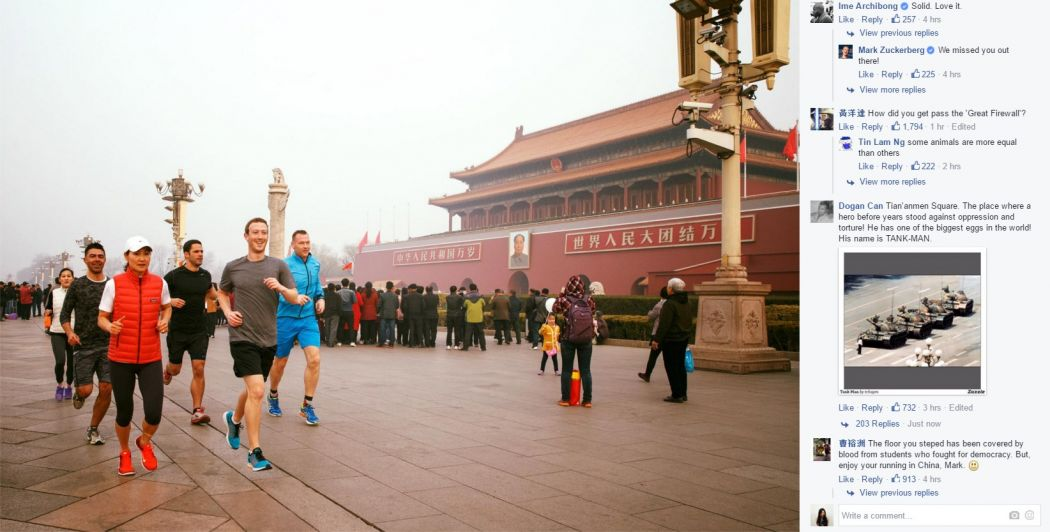
Break on through to the other side
One of the first replies to Zuckerberg’s post asks “How did you get pass the great firewall?” Facebook is blocked in China so Zuckerberg could not have posted this image from his laptop using a wifi network at his hotel or at a cafe without using a Virtual Private Network. A VPN allows users to hide their internet browsing and visit sites the Chinese government blocks like Facebook and Twitter. Zuckerberg most likely posted this photo using a data roaming plan on his mobile phone. Data roaming allows tourists to use their devices the way they do in their home country. On my last visit to Beijing in the summer of 2014, my international T-Mobile plan allowed me to use my Gmail, post on Twitter and navigate the bus system using Google Maps. I saw the city like never before. I don’t know why the Chinese Government hasn’t cracked down on data roaming (as of yet). But the technology is definitely in a different class than the VPN.
When the authorities started cracking down on VPNs in 2016 around a hundred million Chinese Internet users were using them regularly to go online. In 2017, China started jailing vendors and forcing companies to remove listings from their services. China famously forced Apple to remove almost 700 VPN apps from its App Store, and on March 31, 2018 China cracked down even further with a VPN ban, blocking all unlicensed VPN services.
Even though Mark Zuckerberg most likely did not use a VPN this “how did you get pass the great firewall” comment definitely created unwelcome links between his photo and a heavily frowned upon practice. I doubt Zuckerberg is a read the comments kind of guy but still, if he ever runs in China again, I bet he will wait until he is back in Mountain View to post the photos.
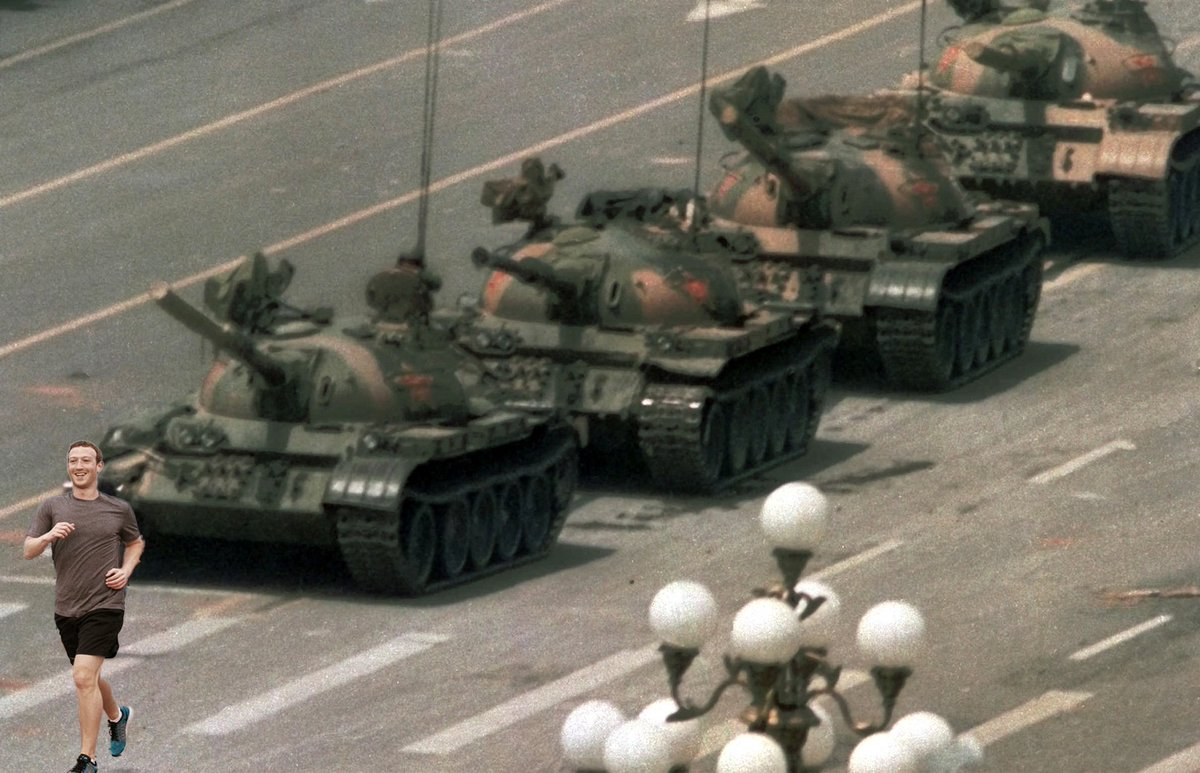
Zuck Man
Many westerners, like Tom Grundy, editor of the Hong Kong Free Press, were quick to reply to Zuckerberg’s post with photoshopped images of Zuckerberg running with tanks in Tiananmen Square. But the significance of this image would be lost on most Chinese users. As Louisa Lim noted in her 2014 book “The People's Republic of Amnesia: Tiananmen Revisited,” only 15 out of 100 Beijing University students could recognize the “Tank Man” photo. The bloody crackdown of June 4th 1989 remains one of the most censored topics in China. Researchers have put together exhaustive lists of images, phrases, numbers, colors and commemorations relating to these events that are all banned online. But the idea that Chinese netizens are locked in an ever escalating battle with the censors over forbidden information, like photos of Tank Man, is a Western fantasy.
On my first visit to China in 2005. I remember sitting in Tiananmen Square wondering if there was a free wifi network. My companion did not want me to take out my laptop because he was convinced the authorities would descend on us if I did. My curiosity got the better of me. Of course there was no Free Tiananmen Square wifi but my misconception was no more ridiculous than my companion’s for no authorities even took notice of us. The internet is managed less by brute force but more by sophisticated rules and software.
Zuckerberg most definitely understands this. He knows that the only path for someone like him to run free in China is through Tiananmen Square not around it.
Zuckerberg has a great track record with authoritarian governments. Facebook helps its friends to keep posts from appearing in people’s news feeds in specific geographic areas. In 2016, the New York Times reported that Facebook had built a new feature, specifically designed for China that would give its potential new friend super powers. China would be able to not just follow stories and topics as they gained traction on the platform, but it would also have the capabilities to suppress posts about sensitive topics from ever showing up in user’s feeds.
How would this work? Let’s take a sensitive topic like pollution. The Chinese authorities cannot stamp out public outrage about pollution but it can suppress online debate about smog or delete any mention of organizing or protest over pollution. Environmental groups are among the most tracked and surveilled organizations in China.
Of course, the authorities would rather people focus on the measures the government is taking to address the pollution problem. China leads the world in investment in renewable energy solutions like solar and wind, there are even hints of a future where oil and diesel cars will be banned. In a mirroring of these government practices, this staged photo provides us with a picture-perfect illustration of how this sort of thing is done. In the smog jog photo there is not a single white face mask even though this is a day where the air quality is officially dangerous. And if we go looking for a white face mask what happens? Our eye is drawn to this little girl, the future of China, proudly holding out a white balloon.
The Art of the Deal
Because Zuckerberg is willing to do whatever it takes (like huff pollution) to prove to the authorities that he can be trusted to run free in China he’s not afraid to grovel. This is what he did when China's Internet Czar Lu Wei visited Facebook's Mountain view campus in December 2014. Zuckerberg proudly showed off the copy of China's President Xi Jinping’s book: "The Governance of China." A book he just happened to have laying around on his desk. Cringe!
Zuckerberg upped the stakes in 2015 at a state dinner at the White House when he asked Xi Jinping, if he would personally offer a Chinese name for his soon-to-be-born first child. President Xi firmly declined. Super Cringe!
We don’t know the exact terms Facebook offered but we do know China ultimately said no. To make matters worse, according to a report in the New York Times, some Facebook employees even quit in disgust over the suppression software it built for China. Facebook’s Andrew “Boz” Bosworth addresses this internal unrest and the secret software in his now infamous June 2016 memo “the Ugly.” “All the work we do in growth is justified,” he wrote, “the work we will likely have to do in China someday, anything that allows us to connect more people more often is a *de facto* good." But is all this ugly justifiable, if Zuck can’t close the deal?
There is another way of looking at this image. Perhaps the smog jog marks the end of Zuckerberg's friendly overtures to China. About a year after his run Zuckerberg mounted an unprecedented sneak attack suggesting the company might be ready to take offensive maneuvers to subvert Chinese government policy. Facebook used a front company and covertly released a photo app, an unbranded version of the Facebook Moments app. It was called Colorful Balloons.
